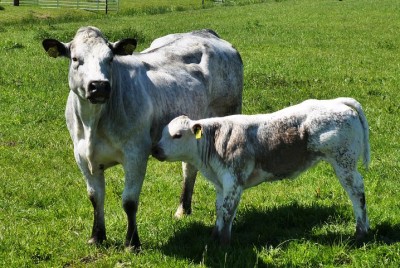Managing for Optimum Body Condition Scores, by Dr. Mark Johnson

Managing for Optimum Body Condition Scores
Mark Z. Johnson, Oklahoma State University Extension Beef Cattle Breeding Specialist
During the normal production cycle a cow should be in her best body condition at the time of calving. After calving, the nutritional stress of lactation will cause most cows to lose weight and body condition up to the point of weaning. Bottomline: it is easier to feed cows for optimum Body Condition Scores (BSC) when they are dry. The (BCS) system is intended to provide a consistent way to quantify relative fatness of cows to serve as a management tool for producers. If cows are to maintain a calving interval of one year, they must bred back within 80 - 85 days after calving. In cows of all ages, it is well established that BCS at calving time determines the rebreeding performance of beef cows in the subsequent breeding season. The system, used to assess a cow's body energy reserves, ranges from 1 to 9. A score of 1 indicates cows that are thin and emaciated, cows of BCS 9 are fat and obese. Pictures and definitions of the BCS system can be found in Chapter 20 of the 8th edition of the OSU Beef Cattle Manual.
There is a strong relationship between weight and BCS. For each unit change in BCS, cows should gain or lose approximately 7% of their BCS 5 weight. For example, a cow that weighs 1,300 lbs. at a BCS 5 should reach a BCS of 6 at 1,391 or drop to a BCS 4 at 1,209 lbs. Cows maintaining body weight, therefore having ample energy reserves before parturition, exhibit estrus sooner than cows losing weight. Body weight change during pregnancy is confounded with fetus and placenta growth. Therefore, the estimation of body fat by use of BCS is more useful in quantifying the energy reserves of beef cows. The process of fetal development, delivering a calf, milk production and repair of the reproductive tract are all physiological stresses. These stresses require the availability and utilization of large quantities of energy to enable cows to rebreed in the required 85 days. Cold and/or wet weather often faced by spring calving cows adds additional environmental stress resulting in energy intake that is below body maintenance needs. The cow compensates by mobilizing stored energy or adipose tissue which is why adequate BCS at calving is so critical to reproductive performance.
Producers should manage their calving season, genetic potential for growth and milk levels, grazing system, supplementation program and herd health to achieve an average BCS of 5 to 6 (target 5.5) in the mature cow herd at calving time. The goal for first calf heifers is a BCS of 6. Typically the greatest reproductive challenge in beef cattle is the breed back of two-year old females raising their first calf, lactating for the first time and still growing themselves, accordingly the higher BCS of 6 is recommended. This fall, as you wean, assess the BCS of cows and manage your feeding and supplementation program accordingly. It will pay dividends in the reproductive performance of your cow herd next spring.
References
Beef Cattle Manual. Eight Edition. E-913. Oklahoma Cooperative Extension. Chapter 20.
Oklahoma Cooperative Extension Service. AFS-3283. Body Condition Scoring of Cows.
Upcoming Events
WEBINAR - Automated Milking Systems Efficiency: Balancing Focus on Individual Cows and System Optimization
May 8, 2024
Please join Cornell the SWNY team and MSU Extension for our talk with Dr. Pablo Silva Boloña on improving efficiency of Automated milking systems by focusing on milking settings for individual and group success.
Broiler Field Day at Sunny Cove Farm
June 6, 2024
Alfred Station, NY
Join us for a field day to explore broiler production, processing, and finances. Meghan Snyder of Sunny Cove Farm will be our host. She raises small batches of organic broilers, processing them on-farm under the 1,000 bird exemption.
Stockmanship and Stewardship 2024
October 25, 2024
Hamburg, NY
Save the date!! The event is one of 4 across the US and is a two-day educational experience featuring low-stress cattle handling demonstrations, Beef Quality Assurance educational sessions, facility design sessions, and industry updates.
Announcements
No announcements at this time.





